Poker Rules
1. How to Play
Big Blind/Small Blind
Poker games typically feature a forced bet, known as the ‘Big Blind’ and ‘Small Blind’ in Hold’em and Omaha games or the ‘Antes’ and ‘Bring-In’ in Stud games. The big blind is usually double the value of the small blind. This forced bet marks the starting pot in any given hand of poker and is the first incentive players have, to win the hand in question. Action arising from the subsequent rounds of betting further increases the size of the pot.
DEALING CARDS AND BETTING ROUNDS
After any initial cards are dealt, players are usually called upon to act in turn, moving clockwise around the table – with the button being the starting point for cards dealt.
THE BUTTON
The button (the “dealer button”) indicates who the dealer is. The dealer button moves clockwise each hand between the active players at the tables.
SHOWDOWN
Once the last bet or raise has been called during the final round of betting, showdown occurs; the remaining active players must show or “declare” their hands and the player(s) with the best ranking hand(s) win the pot. Players often show their hands in clockwise fashion rather than all at the same time commencing from the player who set the bet amount on the river. In a pot where no bet was made on the river and was checked down by all remaining players then the hands are shown commencing clockwise from the small blind. Multiple players can share a single pot, with the pot divided in different ways depending on the game rules and how each player’s hand ranks against their opponents.
PLAYER ACTIONS
Each player can usually take one of the following actions when it is their turn to act: Check – players can only check when there is no bet during the current round, and the act of checking passes the action clockwise to the next person in the hand. If all active players check, the round is considered complete. Bet – players may bet if no other players have bet during the current round. Fold – players who fold forfeit their cards and cannot win or act again during the current hand. Call – players can call if other players have bet during the current round; this requires the calling player to match the highest bet made. Raise – players may raise if other players have bet during the current round; this requires the raising player to match the highest bet made and make a subsequent bet. Additional cards, both hidden and visible, may be dealt to players after each betting round has finished, changing the best poker hand that each player may make with the cards available to them.
BETTING LIMITS
Betting limits refer to the amount players may open and raise. Typically, poker games are of the following limit types; no limit, pot limit, fixed limit or spread limit. No Limit – in poker games with a no limit betting structure, each player can bet or raise by any amount up to and including their full stack (the total number of chips they possess at any given time) in any betting round, whenever it is their turn to act. Pot Limit – in poker games with a pot limit betting structure, each player can bet or raise by any amount up to and including the size of the total pot at that time. Fixed Limit – in poker games with a fixed limit betting structure, each player can choose to call, bet or raise, but only by a fixed amount. The fixed amount for any given betting round is set in advance.
2. Hand Rankings
1. Royal Flush
This hand is unbeatable and very rare. Ten, Jack, Queen, King, and Ace, of the same suit.
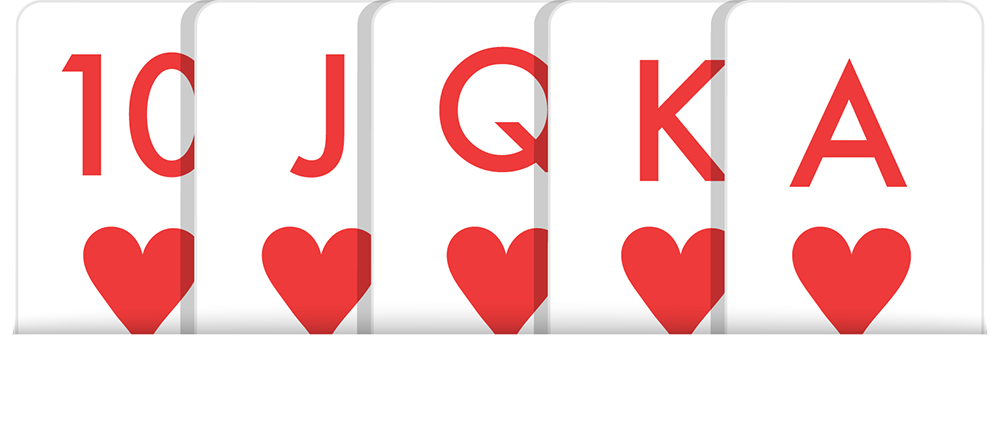
2. Straight Flush
Any five cards in numerical order of the same suit that is not a Royal Flush.
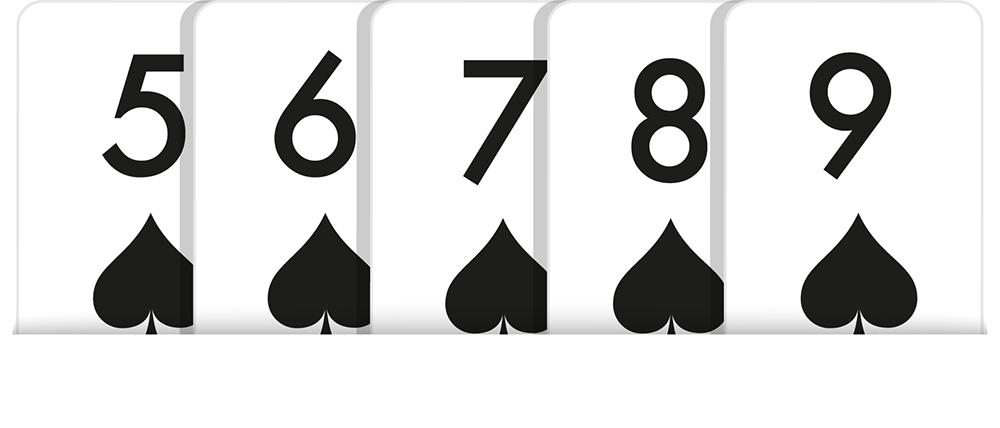
3. Four of a Kind
Four cards of the same value.
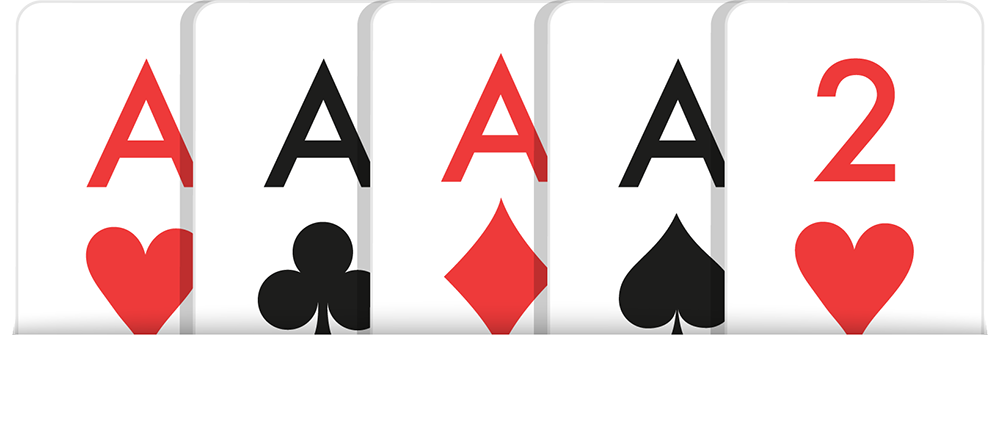
4. Full House
Three cards of one value, and two cards of a second value.
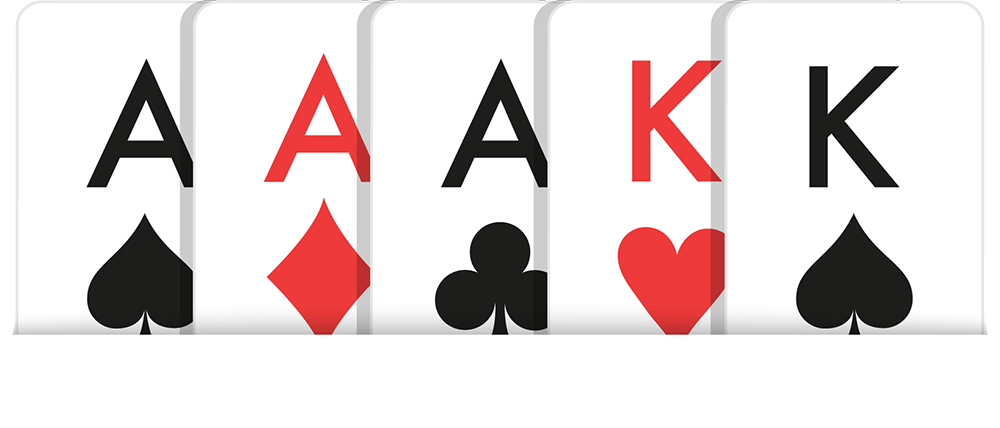
5. Flush
Any five cards of the same suit that do not have an order of a straight.
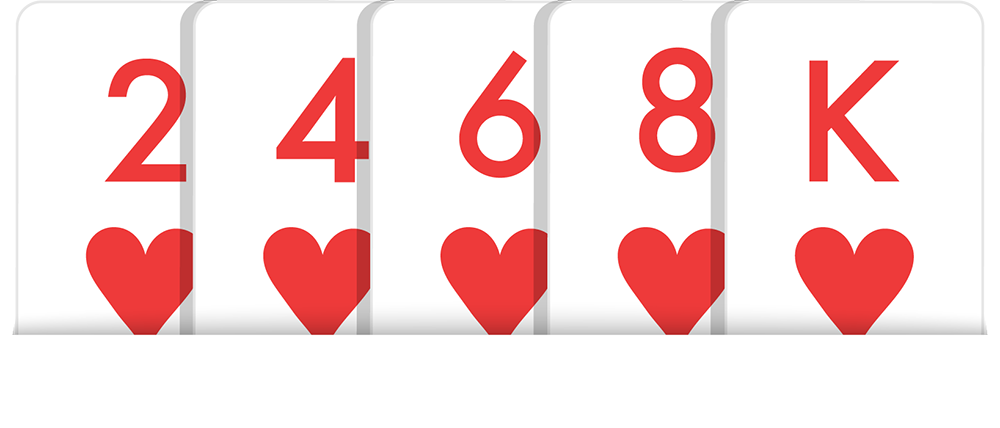
6. Straight
Cards of five numerical order when not all five are of the same suit.

7. Three of a kind
Three cards of the same value and two unrelated high cards.
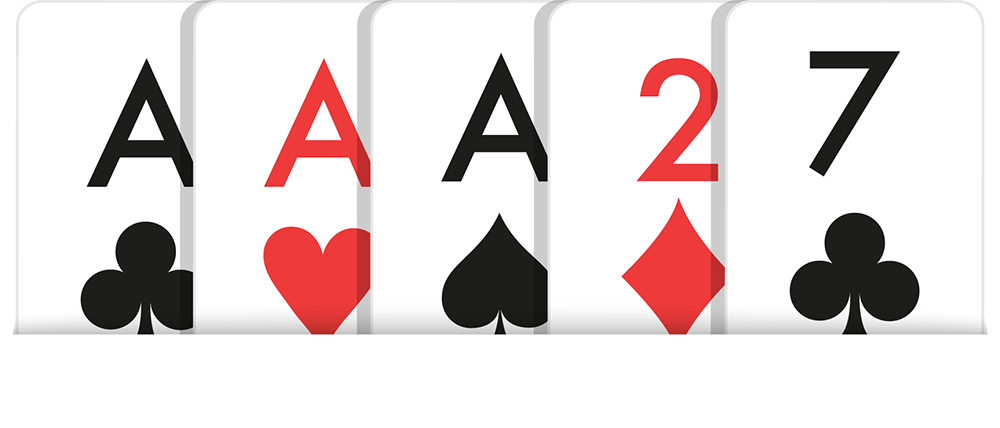
8. Two pairs
Two cards of one value, two cards of another value, and a fifth highest unrelated card.
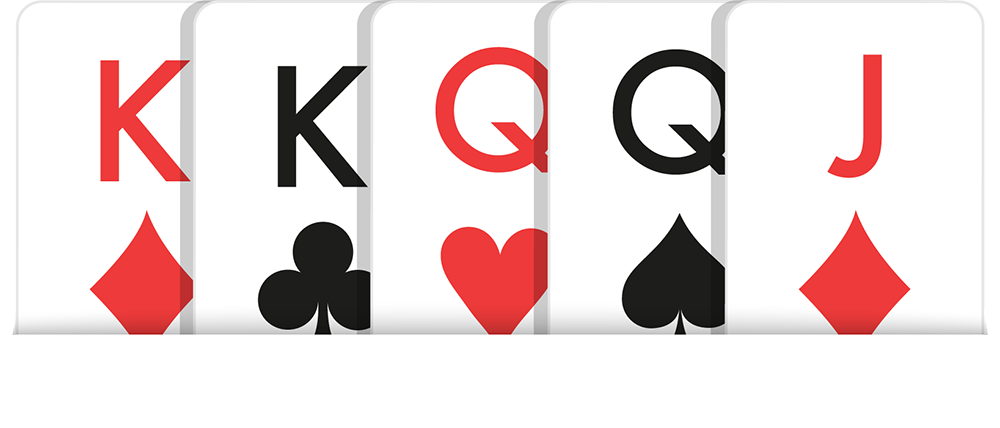
9. Pair
Two cards of the same value and three other highest unrelated cards.
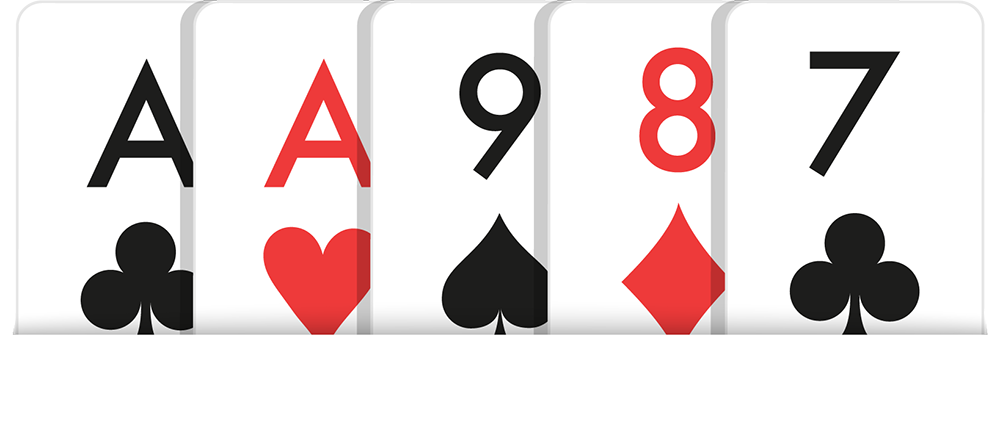
10. High card
Five unrelated cards – no pair, no flush, no straight.
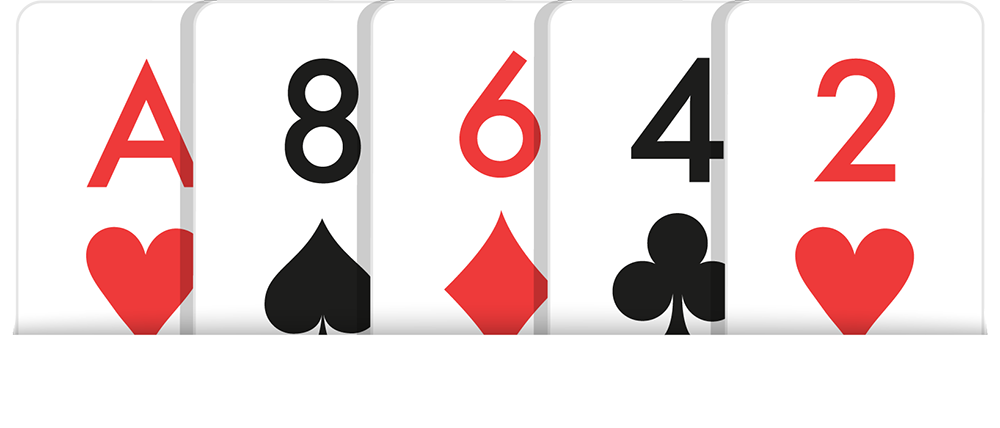
3. Texas Hold’em
Each player is dealt two hole cards faced down. A round of betting ensues. Once this is complete three community cards are dealt face up known as “The Flop”. Another round of betting ensues. A fourth community card is dealt face up known as “the Turn” which leads to another round of betting. A final fifth community card known as “the River” is dealt face up and a final round of betting occurs. Players must combine one or both their hole cards with the five community cards exposed on the table to make the best hand possible. Refer to Poker Hand Rankings above.
4. Omaha
This game is played exactly like Texas Hold’em however the difference is that each player is dealt Four hole cards faced down and must combine two of their hole cards whilst using 3 of the five community cards exposed on the table to make the best hand possible. Refer to Poker Hand Rankings above.
5. Omaha Hi/Lo
This game is played exactly like Omaha. Each player is dealt Four hole cards faced down and must combine two of their hole cards with the five community cards exposed on the table to make the best Hi Hand and Lo Hand possible. The only difference is that a player with a lo hand can also win half the pot. A lo hand consists of 5 unique cards with a value of 8 or lower. The Ace counts as both high and low as per usual. Therefore A,2,3,4,5 is the best possible low hand. It is possible that a low hand can win the whole pot if the high hand does not beat the low straight. If there is no low hand then the high hand wins/scoops the hole pot. A Player can use different combinations of their hole cards to form the best Hi and Lo Hand.
6. 6+ Hold'em
This game is played the same way as Texas Hold’em. Each player is dealt two hole cards faced down and must combine one or both their hole cards with the five community cards exposed on the table to make the best hand possible. Rather than a 52 card deck this game is played with 36 cards as all cards ranging from 2-5 are removed from the deck. Ace still counts as both high Card and low card and therefore A6789 is considered a straight. Poker hand rankings differ in this due to the shift in probability:
1. Royal Flush

2. Straight Flush

3. Four of a Kind

4. Flush

5. Full house

6. Three of a Kind

7. Straight

8. Two Pair

9. One Pair

10. High Card

7. 7-Card Stud & 7 Card Stud Hi/Lo
In a game of 7 card stud each player is dealt seven hole cards throughout the course of the hand. The game is usually played with limit betting and there are no community cards in this game. Three cards are given first with two hole cards faced down and one card face up exposed so all opponents can see. This is called “Third Street”. The player with the lowest ranked card starts the betting action as the Bring in and then players act in clockwise fashion by calling the bet, folding or raising to the lowest limit increment. Once this betting action is completed the remaining players are dealt a fourth card face up. This known as “Fourth Street”. Another interval of betting commences from the first player whose hole cards have the highest poker value.
Once the round of betting is complete another card is dealt face up. This is called “Fifth Street”. Another round of betting commences once again from the player who’s exposed cards have the highest poker value.
Once this round of betting is completed another card face up is given to the remaining players. This is called “Sixth Street”. Another round of betting commences with the same player who has the highest ranked poker hand from the exposed cards. A seventh and final card is dealt face down. This is called “Seventh Street” and a final round of betting occurs. The best hand is determined by combining five of the hole cards.
Hand rankings are identical to Texas Hold’em. The game is usually played with limit betting so if the limit of the game is 100/200 the value of the bet can only be the lower end of the limit (100) on 3rd and 4th street. From the Fifth street onwards the value of the bet is set at the highest limit (200).
In 7 card stud Hi/Lo The game is played exactly the same way however players compete for half the pot by making a lo hand. A player can scoop the hole pot if the low hand is the best hi hand as well. Such as A-2-3-4-5 being a 5 lo or an Ace to 5 straight for Hi.
8. Razz
Razz is a variant of 7 card stud where players only play to make a Lo Hand. Aces are only considered as Lo in this game. Throughout the course of the hand each player is dealt seven hole cards, three of which are face down and four are face up. There are limits to the bets players can make. The only way this game differs to Stud is that players are only trying to make a Lo Hand. Straights and Flushes do not count in this game.
9. Tournaments
Multi-Table Tournaments (MTTs):
A Multi-Table Tournament is a tournament that is scheduled to start at a specific time, where players are given a pre-set amount of chips to play with. Once the player is out of chips they are eliminated from the tournament. The prize pay-outs is also determined at the beginning of the tournament. Pay outs are normally between 10 and 20% of the field. Players play down till there is one remaining player. Table balancing is done throughout.
KO Tournaments:
KO tournaments follow the usual rules of a Multi Table tournament, with the exception that in them, each player has a bounty value. Upon elimination, 50% of the eliminated player's bounty value will be paid out to the player who caused the elimination, while the remaining 50% is added to that player's bounty. The remaining part of the player’s buy-in goes to the normal prize pool in the tournament.
Tournament Registration
Player registration is open until the tournament's listed registration end time. There is a fixed buy-in amount for each tournament, except in Freeroll Tournaments, which do not require a buy-in.
Players can deregister any time up till the scheduled start time of the tournament but once deregistration end time for a tournament has passed, players may not deregister. The buy-in amount and entrance fee are non-refundable once this happens.
Each tournament has a minimum player registration requirement. If registration does not meet the minimum requirements, the tournament is cancelled. If the tournament is cancelled, Players will be refunded their buy-in amount and entrance fee.
If you register for a tournament and are not logged in at the time the tournament starts, you’ll be automatically seated at a table. You are then blinded-off until there are no chips left, or until you log in to play.
Rest Breaks in Tournaments
Multi Table Tournaments have scheduled rest breaks. The frequency and duration of these breaks is determined during the setup of the tournament.
Table Balancing
As players start to get eliminated from the tournament table balancing occurs automatically until we reach down the remaining players for the Final Table.
The Multi-Player Poker system randomly selects the Player to move from one of the tables with the most remaining Players.
The Player is moved to one of the tables with the least remaining number of Players. The Player that is moved is seated at the new table as far away from the big blind as possible, according to the available seats.
10. Sit n Go Tournaments
Sit n Go Tournaments have a predetermined number of entrants, where the tournament automatically starts as soon as the max number of entrants is met.
11. Cash Games
Cash Game follow the same poker concept as tournaments however every chip has an actual monetary value. A player can buy into a cash game if the table is not full. A player can also leave at any time and takes the remainder of their respective chips which is paid out as cash.
12. Twister, Age of the Gods Twister and Wild Twister:
Twister
Twister games have a maximum of 3 players each with a stack of 500 chips competing for a random prize that is generated just prior to the tournament start once all players take their seat. The price can vary between 2 to 1000 times the buy-in.
Age of the Gods Twister
This format is just like the regular Twister format however each player has a stack of 100 chips. At the start of the tournament a prize pool is determined (2 to 100 times the buy-in) in the form of a slot animation. The Age of the Gods jackpot is a multi-level progressive jackpot accumulated from players’ bets in all casinos offering the Age of the Gods games. There are four different jackpots that can be won: Power, Extra Power, Super Power and Ultimate Power. For each bet on an Age of the Gods game, 0.99% of it will be used to fund the jackpot.
Wild Twister
A forced All-in version of Twister where the prizes are Twister Tickets that can be used in either normal Twister Tournaments of the Age of the Gods Twister Tournaments.
13. Chip/Cash Dumping
Chip Dumping is the term given to the case where a player intentionally loses chips to another player. This is not allowed and can result in a player being permanently and completely banned from the iPoker network without compensation.
14. Alias
An Alias is the Nickname of every player and what are known as in the Network. Players can only have one Alias.
15. Collusion, Use of bots and/or third-party software
Poker is a game where individuals play against each. Collaboration between players is not allowed. Comments made from folded players during a hand that can influence an opponent’s action is not allowed. An example of this is stating the hole cards that were folded.
The use of bots or additional software that give players an edge over their opponents by taking decisions on behalf of the player is forbidden.
Soft Play is also forbidden. Soft Play is the term given to the situation where a player checks and allows a showdown instead of raising a hand. This normally occurs on the River.
16. Disconnection
If a Player is disconnected from the system during tournament play, the following rules apply:
- If a Player is disconnected during the play of a hand and have placed a bet, they have 30 seconds to reconnect. If they do not reconnect within thirty seconds, the following happens:
- If the Player has an option to check, their hand is automatically checked.
- If the Player does not qualify to check their hand, or be considered All-In, their hand automatically folds.
- Players that are disconnected and fail to return to the tournament are blinded-off. They should try to log back in again as soon as possible. They will still be seated at their table and will be check/folded until they return.
- If there is an issue on the gaming server preventing the completion of a game, the gameplay for the current hand is cancelled and the player balance for the table is returned to its state at the start of the hand.
- If during a cash game, a player is disconnected, the player will automatically be sat out until they return and choose to post blinds again. The player will not post any blinds during this period. If the player stays sitting out for more than 7 minutes, they will be removed from the table and the amount remaining in their stack will be returned to the player's balance.
17. Interrupted Tournaments
If a tournament may be interrupted due different causes. In such cases, payments will be made as follows (Player eliminated before the interruption will not be refunded in any case):
Heads-Up Tournaments
Both players will be refunded the buy-in + fee.
ALL SNG Tournaments
The remaining players will receive the following compensation:
- Buy-in and Fee is returned.
- Each player receives an equal share of the buy-ins from the eliminated players.
MTT Guaranteed Prize
Compensations will depend on what stage the tournament is at when it is interrupted:
If the prize money stage has not been reached:
(If the tournament is still in the re-buy stage then the prize pool will be the total of the buy-ins + add-ons. Once the re-buy period has closed then the prize pool will be the advertised guaranteed prize.)
- The remaining players will receive the following compensation:
- Buy-in(s) and fee returned.
- The balance of the prize fund is paid out as follows:
- 50% of the fund shared equally among the remaining players.
- 50% distributed proportionally in line with the players' chip counts.
If the prize money stage has been reached:
- The remaining players will receive the following compensation:
- Buy-in(s) and fee returned.
- Each player is awarded an amount equal to the prize that the next eliminated player would have received if the tournament was not interrupted.
- Of the remaining prize pool 50% is distributed equally among the players and 50% is distributed in proportion to their chip counts.
MTT No Guaranteed Prize
If the prize money stage has not been reached:
- The remaining players will receive a refund as follows:
- Buy-in(s) and fee returned.
- The balance of the prize fund is paid out as follows:
- 50% of the fund shared equally among the remaining players.
- 50% distributed proportionally in line with the players' chip counts.
If the prize money stage has been reached:
The remaining players will receive a refund as follows:
- Buy-in(s) and fee returned.
- Each player is awarded an amount equal to the prize that the next eliminated player would have received if the tournament was not interrupted.
- Of the remaining prize pool 50% is distributed equally among the players and 50% is distributed in proportion to the players’ chip counts.
Freerolls
If the prize money stage has not been reached:
- 50% of the fund shared equally among the remaining players.
- 50% distributed proportionally in line with the players' chip counts.
If the prize money stage has been reached:
- Each player is awarded an amount equal to the prize that the next eliminated player would have received if the tournament was not interrupted.
- Of the remaining prize pool 50% is distributed equally among the players and 50% is distributed in proportion to the players’ chip counts.
Twister Events
In cases where the prize pool is less than €1,000:
- Remaining players receive a refund of their buy-in.
- Any remaining prize pool is then distributed in proportion to the players' chip counts.
In cases where the prize pool is €1,000 or greater:
- All remaining players receive a refund of their buy-in.
- All players receive 10% of the remaining prize pool.
- The remaining prize pool is then distributed in proportion to the players' chip counts.
18. House Rules
The House is referred to the authoritative body that reserves the right to do the following:
- Disqualify any Players who do not follow tournament rules, or that act inappropriately during a tournament.
- Change any tournament time, guaranteed prize, or tournament, without prior notice.
- Alter the rules and make final decisions on all tournament related issues as they occur.
- All decisions are Final and at the discretion of the House.
19. Sitting Out
The following rules apply:
If a Player sits out from a tournament, they are blinded-off. If a Player does not return to a tournament, they forfeit all buy-in amounts and entrance fees. If during a cash game, a player sits out for more than 7 minutes, they will be removed from the table and any cash remaining on their stack will be returned to his balance. They won’t be able to sit out on one particular cash game table, while playing on other tables. If they sit out on one cash game table, they will automatically be sitting out on all active cash game tables.
20. Time Bank
Cash Tables:
In tables with blinds lower than €0.05 / €0.10 players have 15 seconds to respond. Past this time, time bank will be activated. In tables with blinds bigger or equal to €0.05 / €0.10 players have 20 seconds to respond. Past this time, time bank will be activated. If a player takes more time and consumes all the time in his time bank, he will be put in ‘sit out’ status.
Player starts the game with 20 seconds in his time bank. These 20 seconds are reduced as the player uses them, and increased by 10 seconds, up to a maximum of 90 seconds, every 50 hands.
Twister and Age of the Gods Twister tournaments:
On Twister tournaments players have 15 seconds to respond. Past this time, the player will be put in ‘sit out’ status.
Multi-table tournaments
On multi-table tournaments, players have 20 seconds turn time, with 30 seconds in their time bank, which is increased with 30 seconds more if they reach the final table. Check the Tournament Lobby for specific Rules of that Tournament as the time can differ.
Sit & Gos
On Heads up and Turbo games, players have 18 seconds turn time.
In the case of Double or nothing, Rockets and Hyper Turbo games, players will have 12 seconds turn time. Past this time, the player will be put in ‘sit out’ status.
Additionally, on tournaments with buy-ins bigger or equal to 500€, players will have a 10 seconds time bank plus, where applicable 10 additional seconds for players reaching the final table.
21. Rake & Fees
On Twister and Age Of The Gods Twister tournaments, fee is a 7% of the entry fee. On Wild Twisters, fee is a 6% of the entry fee.
What are the iPoker rake limits?
On cash tables, rake is taken according to iPoker ranges. It will depend on the cash table limit you’re playing on:
Pot limit and no limit games:
| Blinds | Number of Players | Rake per Pot | Max Rake |
|---|---|---|---|
| 0.01€/0.02€ - 0.02€/0.05€ | 2-10 | 0.01€ for each 0.15€ in the pot | 0.50€ |
| 0.05€/0.10€ | 2 | 0.01€ for each 0.15€ in the pot | 1€ |
| 0.05€/0.10€ | 3-10 | 0.01€ for each 0.15€ in the pot | 2€ |
| 0.10€/0.20€ | 2 | 0.01€ for each 0.20€ in the pot | 2€ |
| 0.10€/0.20€ | 3-10 | 0.01€ for each 0.20€ in the pot | 2€ |
| 0.25€/0.50€ | 2 | 0.01€ for each 0.20€ in the pot | 1€ |
| 0.25€/0.50€ | 3-10 | 0.01€ for each 0.20€ in the pot | 3€ |
| 0.50€/1.00€ | 2 | 0.01€ for each 0.20€ in the pot | 1€ |
| 0.50€/1.00€ | 3-10 | 0.01€ for each 0.20€ in the pot | 4€ |
Limit games:
| Blinds | Number of Players | Rake per Pot | Max Rake |
|---|---|---|---|
| 0.02€/0.04€-0.05€/0.10€ | 2-10 | 0.01€ for each 0.25€ in the pot | 0.04€ |
| 0.10€/0.20€ | 2-10 | 0.01€ for each 0.25€ in the pot | 0.10€ |
| 0.25€/0.50€-0.50€/1.00€ | 2-10 | 0.02€ for each 0.50€ in the pot | 0.40€ |
| 1.00€/2.00€ | 2-10 | 0.02€ for each 0.50€ in the pot | 1.00€ |
| 2.00€/4.00€ | 2 | 0.02€ for each 0.50€ in the pot | 1.00€ |
| 2.00€/4.00€ | 3-4 | 0.02€ for each 0.50€ in the pot | 2.00€ |
| 2.00€/4.00€ | 5-10 | 0.02€ for each 0.50€ in the pot | 3.00€ |
| 3.00€/6.00€-10.00€/20.00€ | 2 | 0.40€ for each 10€ in the pot | 1.00€ |
| 3.00€/6.00€-10.00€/20.00€ | 3-4 | 0.40€ for each 10€ in the pot | 2.00€ |
| 3.00€/6.00€-10.00€/20.00€ | 5-10 | 0.40€ for each 10€ in the pot | 3.00€ |
| 20.00€/40.00€ | 2 | 0.75€ for each 20€ in the pot | 1.00€ |
| 20.00€/40.00€ | 3-4 | 0.75€ for each 20€ in the pot | 2.00€ |
| 20.00€/40.00€ | 5-10 | 0.75€ for each 20€ in the pot | 3.00€ |

